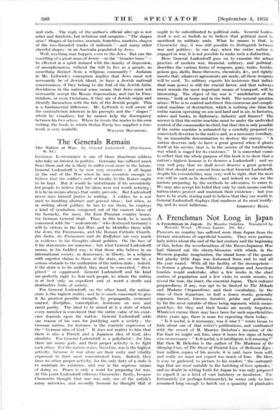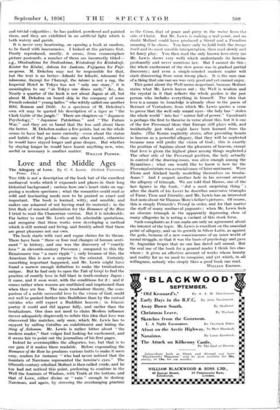A Frenchman Not Long in Japan
PERIIAPS no country has suffered more than Japan from the literary attentions of superficial tourists. They were particu- larly active about the end of the last century and the beginning of this, before the reverberations of the Russo-Japanese War had thinned out the cherry-blossoms with which, in the Western popular imagination, the island hoine of the quaint but plucky little Japs was festooned from end to end all the year round. With all the facility of the incompetent— to borrow a phrase from Whistler—European and American tourists would undertake, after a few weeks in the chief centres of population and a few visits to scenic resorts; to reveal the true, the inner, the essential Japan. Their cultural preparedness, if any, was apt to be limited to The Mikado and Madame Chrysantlieme, and their vocabulary, by the time of their departure, to half a dozen words, generally sayonara, banzai, kimono, harakiri, geisha and yoshiwara, by far the most suitable of these being sayonara, which means good-bye, for they and their books are mostly forgotten. Whatever excuse there may have been for such superficialities thirty years ago, there is none for repeating them today.
" Is it useful, is it necessary, was it wise ? " wrote Gosse to Gide about one of that writer's publications, and confronted with the record of M. Maurice Dekobra's invasion of the Far Fast we might ask him, since it bears few signs of being wise or necessary : "'Is it useful, is it intelligent, is it amusing ?" But then M.' Dekobra is the author 'of The Madonna of the Sleeping Cars, of The Street of Painted Lips, of Bedroom Eyes ; four million eopiea of his novels, it is said, have been sold, and really we must not expect too much of him. He likes, it may be gathered, to picture to his readers " the surround- ings that are most suitable to the hatching of love episodes," -Muria) dcrubt insetting Ifirth. for Japan he was only prepared to regard it as 'a kind 'of vast hatchery or incubator. Un- lortuisatelyr`(oi PerhaPs fortunately), he seems only to have 'rerriairied long -Cho-ughto hatch Out a quantity of platitudes
and trivial vulgarities ; he has padded, powdered and painted them, and they are exhibited in an artificial light which is both watery and garish.
It is never very heartening, on opening a book at random, to be faced with inaccuracies. I looked at the pictures first. Poorly reproduced, mostly, it seems, from commonplace picture postcards, a number of them are incorrectly titled- Otsukushima for. lisukushinaa, Kinkakuyi for Kinkakuji, Kintar for Kintai, Askusa for Asakusa, Fujiyaina for Fuji- ao-yama. M. Dekobra may not be responsible for that, but the text is no better--hibachi for hibachi, tokonomi for tokonoma, Suzenji for Chuzenji, the latami is not a rug, the .Imperial Hotel in Tokyo has not " only one story," it is meaningless to say " in Tokyo one dines early," &c., &c. Nearly a quarter of the book is not about Japan at all, but about M. Dekobra on board ship in the company of some French colonial " young ladies "who wittily called one another Bibi, Zonzon and Dede. As a specimen of M. Dekobra's own wit may be quoted his description of a tiger as " the Clark Gable of the jungle." There are chapters on " Japanese Psychology," " Japanese Patriotism " and " The Future War," and they are so banal that the less said about them the better. M. Dekobra makes a few points, but on the whole seems to have had no more curiosity—even about the status and habits of the geisha—than any other tourist, otherwise he would have stayed longer and gone deeper. But whether by staying longer he would have learnt anything new, wise, useful or necessary is another matter. WILLIAM PLOMER.







































 Previous page
Previous page